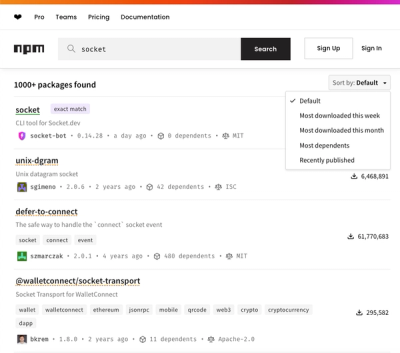
Security News
npm Updates Search Experience with New Objective Sorting Options
npm has a revamped search experience with new, more transparent sorting options—Relevance, Downloads, Dependents, and Publish Date.
The nyc npm package is a command-line tool that allows for JavaScript code coverage. It is built on top of Istanbul and works well with subprocesses. It is often used for tracking how well your unit-tests exercise your codebase.
Code Coverage
This feature allows you to collect code coverage information from your tests. You can use it with a test runner like mocha by adding it to your npm scripts in your package.json file.
"scripts": {
"test": "nyc mocha"
}Check Coverage Thresholds
nyc can enforce coverage thresholds. If code coverage falls below the specified thresholds, nyc will exit with a failure status. This is useful for maintaining a high standard of test coverage in a project.
"scripts": {
"test": "nyc --check-coverage --lines 95 --functions 95 --branches 95 mocha"
}Report Generation
After running your tests with nyc, you can generate various types of coverage reports. This example shows how to generate a report in the 'lcov' format, which can be used with tools that support lcov coverage reports.
"scripts": {
"coverage": "nyc report --reporter=text-lcov > coverage.lcov"
}Integration with CI/CD
nyc can be integrated with continuous integration/continuous deployment (CI/CD) systems. In this example, coverage information is piped to the 'coveralls' service to track coverage over time.
"scripts": {
"coveralls": "nyc report --reporter=text-lcov | coveralls"
}Istanbul is the underlying tool that nyc is built upon. It provides a JavaScript code coverage tool that computes statement, line, function, and branch coverage with module loader hooks to instrument code on the fly.
c8 is a code coverage tool that uses Node.js' built-in V8 coverage. It is similar to nyc but does not use instrumented code and is built directly on V8's native coverage features, potentially providing more accurate coverage metrics.
Jest is a delightful JavaScript Testing Framework with a focus on simplicity. It works out of the box for any React project. Jest provides its own way to track code coverage without needing an additional package like nyc.
Blanket is a simple code coverage library for JavaScript that works both in the browser and with Node.js. It is less commonly used now and has been largely superseded by tools like nyc and istanbul.
nyc npm test
a code coverage tool built on istanbul that works for applications that spawn subprocesses.
Simply run your tests with nyc, and it will collect coverage information for
each process and store it in .nyc_output.
nyc npm test
you can pass a list of Istanbul reporters that you'd like to run:
nyc --reporter=lcov --reporter=text-lcov npm test
If you're so inclined, you can simply add nyc to the test stanza in your package.json:
{
"script": {
"test": "nyc tap ./test/*.js"
}
}
nyc exposes istanbul's check-coverage tool. After running your tests with nyc, simply run:
nyc check-coverage --lines 95 --functions 95 --branches 95
This feature makes it easy to fail your tests if coverage drops below a given threshold.
Once you've run your tests with nyc, simply run:
nyc report
To view your coverage report:
--------------------|-----------|-----------|-----------|-----------|
File | % Stmts |% Branches | % Funcs | % Lines |
--------------------|-----------|-----------|-----------|-----------|
./ | 85.96 | 50 | 75 | 92.31 |
index.js | 85.96 | 50 | 75 | 92.31 |
./test/ | 98.08 | 50 | 95 | 98.04 |
nyc-test.js | 98.08 | 50 | 95 | 98.04 |
./test/fixtures/ | 100 | 100 | 100 | 100 |
sigint.js | 100 | 100 | 100 | 100 |
sigterm.js | 100 | 100 | 100 | 100 |
--------------------|-----------|-----------|-----------|-----------|
All files | 91.89 | 50 | 86.11 | 95.24 |
--------------------|-----------|-----------|-----------|-----------|
you can use any reporters that are supported by istanbul:
nyc report --reporter=lcov
By default nyc does not instrument files in node_modules, or test
for coverage. You can override this setting in your package.json, by
adding the following configuration:
{"config": {
"nyc": {
"exclude": [
"node_modules/"
]
}
}}
By default nyc does not collect coverage for files that have not
been required, run nyc with the flag --all to enable this.
Behind the scenes nyc uses istanbul. You
can place a .istanbul.yml file in your project's root directory to pass config
setings to istanbul's code instrumenter:
instrumentation:
preserve-comments: true
coveralls.io is a great tool for adding coverage reports to your GitHub project. Here's how to get nyc integrated with coveralls and travis-ci.org:
npm install coveralls nyc --save
{
"script": {
"test": "nyc tap ./test/*.js",
"coverage": "nyc report --reporter=text-lcov | coveralls",
}
}
add the environment variable COVERALLS_REPO_TOKEN to travis, this is used by
the coveralls bin.
add the following to your .travis.yml:
after_success: npm run coverage
That's all there is to it!
Note: by default coveralls.io adds comments to pull-requests on GitHub, this can
feel intrusive. To disable this, click on your repo on coveralls.io and uncheck LEAVE COMMENTS?.
v3.2.2 (2015/09/11 22:02 -07:00)
FAQs
the Istanbul command line interface
The npm package nyc receives a total of 4,162,961 weekly downloads. As such, nyc popularity was classified as popular.
We found that nyc demonstrated a healthy version release cadence and project activity because the last version was released less than a year ago. It has 3 open source maintainers collaborating on the project.
Did you know?

Socket for GitHub automatically highlights issues in each pull request and monitors the health of all your open source dependencies. Discover the contents of your packages and block harmful activity before you install or update your dependencies.

Security News
npm has a revamped search experience with new, more transparent sorting options—Relevance, Downloads, Dependents, and Publish Date.

Security News
A supply chain attack has been detected in versions 1.95.6 and 1.95.7 of the popular @solana/web3.js library.

Research
Security News
A malicious npm package targets Solana developers, rerouting funds in 2% of transactions to a hardcoded address.